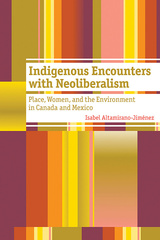
Assembling Unity
Indigenous Politics, Gender, and the Union of BC Indian Chiefs
Established narratives interpret the drive for Indigenous unity solely as a phenomenon that emerged in response to the political agenda of the settler state. But the evolving and multifaceted concept of unity has long shaped the modern Indigenous political movement.
Through a detailed history of the Union of BC Indian Chiefs (UBCIC), one of Canada’s leading Indigenous political organizations, Assembling Unity explores the relationship between pan-Indigenous politics in British Columbia and global political ideologies. Situating Indigenous perspectives on governance firmly in the foreground of her study, Sarah Nickel demonstrates that while unity has been an enduring goal for BC Indigenous peoples, its articulation was heavily negotiated between UBCIC members, grassroots constituents, and Indigenous women’s organizations. She draws on oral interviews, newspaper articles, government documents, and UBCIC records to expose the uniquely gendered nature of political work, as well as the economic and emotional sacrifices that activists make.
Assembling Unity offers new insights into the evolution of political movements, the concept of unity in politics, and gendered political expressions. In the process, this incisive work unsettles dominant Western and patriarchal political ideals that cast Indigenous men as reactive and Indigenous women as invisible and apolitical.
This book will appeal to scholars and students of history, BC studies, and Indigenous studies, particularly those with an interest in gender and politics. It will also find an audience among Indigenous communities, activists, and political leaders.
Awards
- 2020, Commended - Best Scholarly Book in Canadian History, Canadian Historical Association
- 2020, Winner - Indigenous History Book Prize, Canadian Historical Association
"Assembling Unity offers a great deal to scholars interested not only in the Canadian context but more broadly in Indigenous politics and Indigenous feminisms. Nickel’s conceptual framework stands as a model to inspire other scholars who seek to use insights from Indigenous studies in order to reframe old debates and frameworks."
Assembling Unity is an important book. Sarah Nickel’s timely study of the Union of BC Indian Chiefs was shortlisted for the Canadian Historical Association’s 2020 Best Scholarly Book in Canadian History Prize and was recently announced the winner of this year’s CHA Indigenous History Book Prize. Both accolades are much deserved.
A rich examination of the work Indigenous political leaders and grassroots organizers did to negotiate unity as part of a longer history of political activism in the context of continued settler colonialism.
Assembling Unity is a much needed resource that should be read by those wanting to learn about the historical issues BC Indigenous communities have faced – the same issues we continue to raise with current Canadian governments with little improvement.
Beginnings
Part 1: Pan-Indigenous Unity
1 Unity: “United we stand, divided we perish”
2 Authority: “Ordinary Indians” and “the private club”
3 Money: “A blessing and a golden noose”
Part 2: A Philosophical Revolution and Competing Nationalisms
4 Refusal: “Empty words and empty promises”
5 Protest: Direct Action through “Militant May”
6 Sovereignty: “If you really believe that you have the right, take it!”
Reflections
Appendix
Notes
Bibliography
Index














